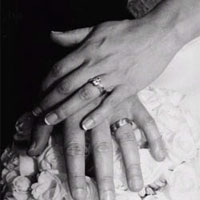- About Us
- Columns
- Letters
- Cartoons
- The Udder Limits
- Archives
- Ezy Reading Archive
- 2024 Cud Archives
- 2023 Cud Archives
- 2022 Cud Archives
- 2021 Cud Archives
- 2020 Cud Archives
- 2015-2019
- 2010-2014
- 2004-2009
 |
The Future of Marriage |
The recent action by the Federal Government in overturning the ACT’s ‘Civil Union’ bill has once again highlighted the issue of marriage – not ‘gay’ marriage, but marriage itself. What is it? Has it past its use-by date? Does it need to be modified for the 21st century?
The current mob in Canberra has decided to define marriage as a “lifelong union freely entered into by a man and a woman”. This raises two issues about marriage – its duration and its gender. We’ll get to both soon.
 But first, a few facts: The age at which people are marrying is increasing. The average age for an Australian male entering his first marriage is now 29 and 27 for a female. This is an increase from 25 and 22 respectively in 1985. The divorce rate is now about 50%, so this wonderful institution that we must ‘protect’ at all costs only gets it right half the time – good thing it’s not a business, a football team or even a political party! There are many reasons for both these sets of statistics that are not relevant for our purposes here, but the fact remains that is what they are.
But first, a few facts: The age at which people are marrying is increasing. The average age for an Australian male entering his first marriage is now 29 and 27 for a female. This is an increase from 25 and 22 respectively in 1985. The divorce rate is now about 50%, so this wonderful institution that we must ‘protect’ at all costs only gets it right half the time – good thing it’s not a business, a football team or even a political party! There are many reasons for both these sets of statistics that are not relevant for our purposes here, but the fact remains that is what they are.
Duration: Who said marriage was meant to be for life? As a minister, I’ve performed over five hundred of them. I have no idea what my ‘batting average’ is, although I do know that one marriage I performed didn’t survive the honeymoon! I have looked again at the Bible and while there is some stuff said about divorce, nowhere does it say that marriage is forever. Jesus said that it doesn’t last beyond the grave (and I’m sure that’s a great relief to many!). One might infer that if divorce is frowned upon, then that must at least imply that marriage is meant to be for life, but that’s not what the apostle Paul indicates. He allows divorce and re-marriage if the marriage ends for reasons of being ‘unequally yoked’ – in 1st century Corinth this related to the idea of Christians marrying pagans. The reason he thought it was a dumb idea was that there were just too many differences (of religious faith, ethics and values) to make it work. No point marrying and fighting all the time - one will just drag the other down (this is just common sense, isn’t it?). When he adds desertion and adultery into the mix, they’re probably high on the list of reasons why marriages have always failed.
If half of all marriages don’t last forever, and if some of those that do, do so only because of a belief that divorce is ‘wrong’ or illegal, then why do we promote the notion that a ‘lifelong union’ is the ideal?
 Suggestion: Why shouldn’t a couple be able to get married for a specific term, which is renewable? After all, marriage is a contract, so why couldn’t we add a time clause? I’d be quite willing to marry a couple who agreed to be married for five years and then they would examine their relationship and if it wasn’t working out, the annulment could be clean, neat and without rancor. If it was going well then it would continue on or could be renewed for another period. A property settlement could be agreed to beforehand (a modified pre-nuptial arrangement). A clause would be added for the care of any children who may be born – and this may well be a reason for a mid-term re-negotiation.
Suggestion: Why shouldn’t a couple be able to get married for a specific term, which is renewable? After all, marriage is a contract, so why couldn’t we add a time clause? I’d be quite willing to marry a couple who agreed to be married for five years and then they would examine their relationship and if it wasn’t working out, the annulment could be clean, neat and without rancor. If it was going well then it would continue on or could be renewed for another period. A property settlement could be agreed to beforehand (a modified pre-nuptial arrangement). A clause would be added for the care of any children who may be born – and this may well be a reason for a mid-term re-negotiation.
It sounds cold and callous. This would upset the family lawyers and many church people would go ballistic, but when the dust settles, why not?
When I speak with a couple about the difficulties in their relationship I always ask, “Do you want to remain married to each other, or do you want to separate?” If it’s the former then we look at strategies to strengthen the marriage, and if it’s the latter, we look at strategies that create a peaceful and dignified ending. The strategies are obviously very different. Just asking that question has a powerful effect. It’s because I’ve been asking people that question for over twenty years that I make the suggestion above.
Gender: For two thousand years the Church has had hang-ups about sex. I don’t know where, when or how it started. It may be since when Adam and Eve covered up in the Garden of Eden that we became prudish and ashamed. For some, the primary purpose of sex is pro-creation. The 1.5 billion residents of China wouldn’t agree. The infertile wouldn’t agree. Most people wouldn’t agree. For some, sex is the ultimate expression of relationship and therefore should be confined to marriage or at least until after a commitment of the parties to each other is made, while for others it’s just fun. There are many degrees in between. Today of course many heterosexual couples are choosing not to have children or to have only one child. The government’s definition of marriage mentions nothing about procreation.
 The question is simple and the answer is obvious. Why shouldn’t two people who love each other enough to want to commit themselves to one another be able to do so in a way that is socially acceptable and legally recognized? Surely it’s a matter of simple justice and fairness.
The question is simple and the answer is obvious. Why shouldn’t two people who love each other enough to want to commit themselves to one another be able to do so in a way that is socially acceptable and legally recognized? Surely it’s a matter of simple justice and fairness.
There is much discussion within the gay community as to whether marriage is the most appropriate expression of their relationships. This is a very important discussion to have. It may be that ‘marriage’ in itself ought to be left to heterosexuals and have something akin to what the ACT was proposing or what is now the case in the UK for gay couples. That discussion is parallel to but not the same as the question I am asking here.
My experience leads me to the conclusion that marriage is probably still an appropriate expression of a relationship but for it to survive with any real credibility in the 21st century we need to look at some modifications. I offer these thoughts to begin that discussion.
Rev. Neil Ericksson is a Minister in the Uniting Church in Australia and has worked in School and University Chaplaincy, and in various parishes both city and rural.
